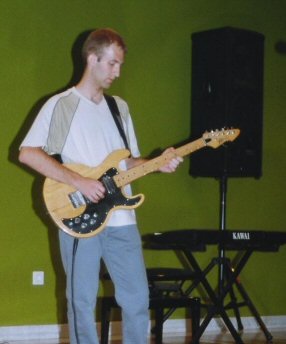 Jorge
Calderon Moreno is a guitarist and keyboardist with an interesting side
as a composer. He makes a kind of music without ties, which flows
freely between the romantic aspect of New Instrumental Music and the
most symphonic part of European folk, also including some Classical,
Atmospheric and Progressive Rock touches. We have a good sample of his
task in the album "El Chico de Reading" (The Boy from Reading). His
live performances, where he has played some pieces of this work, have
been very well received, and make us think that his activity as a
composer will influence the panorama of the instrumental musics today.
Jorge
Calderon Moreno is a guitarist and keyboardist with an interesting side
as a composer. He makes a kind of music without ties, which flows
freely between the romantic aspect of New Instrumental Music and the
most symphonic part of European folk, also including some Classical,
Atmospheric and Progressive Rock touches. We have a good sample of his
task in the album "El Chico de Reading" (The Boy from Reading). His
live performances, where he has played some pieces of this work, have
been very well received, and make us think that his activity as a
composer will influence the panorama of the instrumental musics today.Jorge entered the world of music at age ten, when he started playing a mini keyboard his brother bought. "I used to enjoy myself with it, making songs and the like." Already at age seventeen he was bought a keyboard. With it he followed a three-year-course of music, besides starting to play the lute and the Spanish guitar. At age twenty he bought an electric guitar and he also started working with it. With respect to composing, he began doing so as soon as he got his keyboard, at age seventeen.
About the musical influences that have somehow set a path for his style, he remarks: "Mostly, Mike Oldfield, above any other musician or kind of music, although I also believe that other bands such as Pink Floyd, or Jean Michel Jarre have likewise influenced me, as well as Classical Music composers, (Vivaldi, Beethoven)..." He acknowledges that his tastes include very different styles: Folk, Rock, Pop, Celtic, New Age, Classical Music, and others.
For the time being, he doesn't consider himself related to any given label or musical trend in particular. "I guess that labels will be given by the musical critics as they listen to the kind of music I create. Nor would I have any problems should they classify what I do within any given kind of music".
About the process he usually follows to compose and record any tracks, he explains: "Normally a melody comes to my head, and from it I develop the rest. At the moment, I have always done so like this, although I would like to try creating melodies that ended up becoming an accompaniment for others. I record track by track until everything comes up to my taste and afterwards I mix the tracks. I generally do it all online so as to avoid background noises".
Practically anything that attracts his attention is useful for him as an inspiration when it comes to composing. "Nonetheless, there are pieces that I compose without thinking of any given idea, that is to say, without looking for a parallel story or an image... They may simply reflect a given, momentary mood".
In "El Chico de Reading" we find seven original pieces of a great strength, besides a version of the popular anonymous theme "The House of the Rising Sun". The melody is very well defined in all his compositions, while at the same time constituting the dominant element. The constructions of his themes are varied, as well as the emotions they generate. There are pieces with an air of happy Folk that seem to evoke the racket of a traditional open-air party. Others are of a classicist leaning and a more solemn shade, guided by a melancholy romanticism that suggests all the intensity of feelings. An impressive electronic guitar solo which agilely shapes a melody with a Folk air, slightly sad and nostalgic, captivates us very strongly. We also find passages where the mystery is pervaded with a crystalline, pure, ingenuous beauty, as if evoking the magic in fairy tales and in the illusions of childhood that vanish as we grow up.
